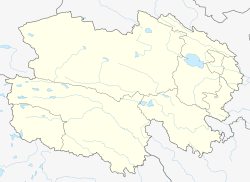Yushu
玉树市 · ཡུལ་ཤུལ་གྲོང་ཁྱེར། | |
|---|---|
| Yüxü | |
 Yushu (red) in Yushu Tibetan Autonomous Prefecture (yellow) and Qinghai | |
| Coordinates: 33°00′N 97°00′E / 33.000°N 97.000°E | |
| Country | China |
| Province | Qinghai |
| Autonomous prefecture | Yushu |
| Municipal seat | Gyêgu |
| Area | |
| • Total | 13,462 km2 (5,198 sq mi) |
| Elevation | 3,689 m (12,103 ft) |
| Population (2020)[1] | |
| • Total | 141,308 |
| • Density | 10/km2 (27/sq mi) |
| Time zone | UTC+8 (China Standard) |
| Postal code | 815000 |
| Area code | 0976 |
| Website | www |
| Yushu City, Qinghai | |||||||
|---|---|---|---|---|---|---|---|
| Chinese name | |||||||
| Simplified Chinese | 玉树市 | ||||||
| Traditional Chinese | 玉樹市 | ||||||
| |||||||
| Tibetan name | |||||||
| Tibetan | ཡུལ་ཤུལ་གྲོང་ཁྱེར། or ཡུས་ཧྲུའུ་གྲོང་ཁྱེར། | ||||||
| |||||||
Yushu (Tibetan: ཡུལ་ཤུལ་གྲོང་ཁྱེར།, Chinese: 玉树市), also Romanized as Yüxü, is a county-level city[2] of Yushu Tibetan Autonomous Prefecture in Southern Qinghai Province, China. It comprises a surface area of 13,462 square kilometres (5,198 sq mi).[3] In 2010, the overall city's population was 120,447 and 56,802 live within the city core. There are around 356,000 people in the metropolitan area in 2020. Yushu is the fourth largest city in Qinghai.
The city seat is the town of Gyêgu (also known as Yushu and Jiegu in Chinese), built in the valley of the Batang River, a right tributary of the Tongtian, which becomes the Jinsha at their confluence. All of these makeups part of the Yangtze watershed. In fact, almost the entire area of Yushu Tibetan Autonomous Prefecture is nomadic pastureland, except for Yushu city.
- ^ "玉树州第七次全国人口普查公报(第二号)——市县级常住人口情况" (in Chinese). The Paper. 2021-06-30.
- ^ 民政部关于同意青海省撤销玉树县设立县级玉树市的批复 [Ministry of Civil Affairs approves the approval of Qinghai Province to revoke the establishment of a county-level Yushu City in Yushu County] (in Chinese). Archived from the original on December 19, 2013.
- ^ For comparison, the total surface area of Beijing municipality is 16,801.25 km2 (6,487.00 sq mi).
